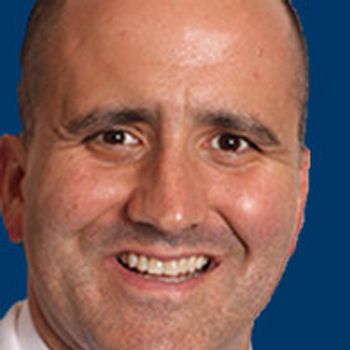
A theme of the 2019 NCCN Annual Conference was the expansion of biomarker testing to guide treatment, and a review of brand-new changes for guidelines in colorectal cancer was no different.

Your AI-Trained Oncology Knowledge Connection!


A theme of the 2019 NCCN Annual Conference was the expansion of biomarker testing to guide treatment, and a review of brand-new changes for guidelines in colorectal cancer was no different.

Jarushka Naidoo, MD, BCh, discusses the application of biomarker testing for use of checkpoint inhibitors in patients with cancer.

Anthony J. Olszanski, MD, RPh, discusses the treatment selection process for use of cemiplimab in patients with cutaneous squamous cell carcinoma.

An updated guideline (version 1.2019) from the NCCN for the management of ovarian cancer recommends specific PARP inhibitors for the treatment of recurrent disease, describes patient selection criteria for each agent, and establishes criteria for PARP inhibitor maintenance therapy.

Thomas W. Flaig, MD, discusses the latest updates to the NCCN guidelines for the treatment of patients with muscle-invasive bladder cancer and highlights the latest approvals of checkpoint inhibitors in this patient population.

PD-L1 testing, while an imperfect biomarker, is the key determinant of frontline immunotherapy selection in the NCCN guidelines for non–small cell lung cancer.

With careful monitoring, discontinuation of TKI therapy is considered safe in adult patients with chronic myeloid leukemia in the chronic phase, who achieve and maintain a major molecular response.

Emmanuel S. Antonarakis, MD, discusses the prevalence of mismatch repair and homologous recombination deficiency genes and how they may play a role in determining a patient’s treatment plan in addition to promising agents that have been introduced to the field in clinical trials.

Louis B. Nabors, MD, of University of Alabama, Birmingham Comprehensive Cancer Center, discusses the evolving treatment landscape for patients with brain metastases.

William J. Gradishar, MD, discusses the latest updates in HER2-negative advanced breast cancer and the role of molecular assays in this space.

In recent years, pancreatic has passed breast cancer as the third leading cause of cancer death in the United States, and by 2030 it could be the leading cause.

The 2019 National Comprehensive Cancer Network guideline on the management of advanced clear cell renal cell carcinoma undergoes a major shift in risk category used to define preferred and alternative first-line treatments.

​​John H. Ward, MD, discusses his preferences in multilane testing for patients with hormone receptor–positive, node-negative breast cancer.

Gary H. Lyman, MD, MPH, medical oncologist, Fred Hutchinson Cancer Research Center, discusses the differences in approving a biosimilar and the original biologic product during the 2019 NCCN Annual Conference.

Matthew A. Gubens, MD, MS, discusses an update to the NCCN Guidelines regarding patients with PD-L1 non–small cell lung cancer.

Alan P. Venook, MD, The Madden Family Distinguished Professor of Medical Oncology and Translational Research at the University of California, San Francisco Helen Diller Family Comprehensive Cancer Center, discusses how treatment strategies have evolved for patients with colorectal cancer.

William Gradishar, MD, Betsy Bramsen Professorship of Breast Oncology, Professor in Medicine-Hematology/Oncology, Northwestern University Feinberg School of Medicine, discusses changes to the NCCN Breast Cancer Guidelines.

A new NCCN guideline for the management of vulvar cancer outlines the use of resection, radiation therapy, and chemotherapy based on disease site and stage, recognizing that only 2 randomized treatment trials have been completed.

Jeffrey Jones, MD, MPH, assistant professor of Internal Medicine, Division of Hematology, Department of Internal Medicine, Ohio State University Wexner Medical Center, discusses NCCN recommendations for treatment of relapsed patients with chronic lymphocytic leukemia (CLL).

At the 2016 NCCN Annual Conference, William J. Gradishar, MD, discussed updates to the NCCN Breast Cancer Guideline and the latest research developments in the field.

Testing for EGFR mutations should be routine in patients with non–small cell lung cancer. With the presence of an EGFR mutation TKIs are an appropriate treatment option across multiple lines of therapy, according to the latest update from the NCCN.

Jeffrey Jones, MD, updated attendees at the 2016 NCCN Annual Conference on the latest developments in chronic lymphocytic leukemia.

The updated NCCN myeloma guideline broadens the diagnostic criteria for active disease and integrates novel therapies into the treatment paradigm.

Leora Horn, MD, MSc, clinical director, Thoracic Oncology Program, assistant vice chancellor for faculty development, Vanderbilt-Ingram Cancer Center, provides her thoughts on how agents targeted T790M-mutant NSCLC will be incorporated into NCCN guidelines.

Kenneth C. Anderson, MD, Giant of Cancer Care: Myeloma, Dana-Farber Cancer Institute/Brigham and Women's Cancer Center, discusses how the definition of myeloma has changed.

While biosimilars have the potential to create competition and result in healthcare savings, the path to the marketplace has proven complex.

Kilian Salerno, MD, director of Breast Radiation and Soft Tissue/Melanoma Radiation, Roswell Park Cancer Institute, discusses hypofractionated radiotherapy for the treatment of patients with early-stage breast cancer.

Locoregional therapies are now considered potentially curable options that should be considered alongside transplant and resection for patients with hepatocellular carcinoma.

James Mohler, MD, chair, Department of Urology, associate director, Translational Research, Roswell Park Cancer Institute, discusses the use of androgen-deprivation therapy (ADT) for patients with prostate cancer and how the use is reflected in the NCCN guidelines.

The NCCN's Evidence Blocks need further data and refinement to overcome subtleties of distinction in drug performance, but they’re the best value system developed so far, NCCN officials reported at their 2016 Annual Conference.